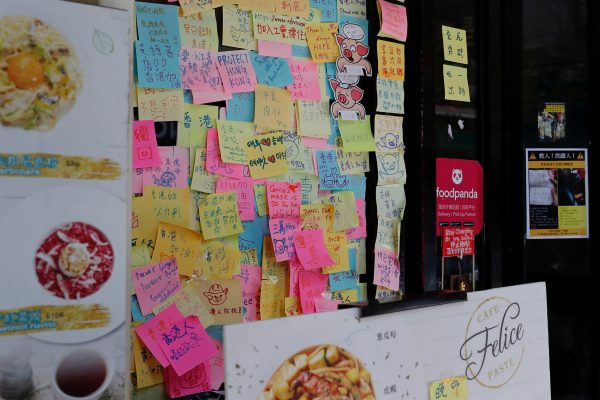The ‘yellow economy’ — in which Hong Kong residents buy from pro-democracy businesses while boycotting pro-government operators — formed by pro-democracy businesses and consumers is the most visible expression of politics in the post-NSL era. But the new political environment threatens the sustainability of the yellow economy.
The yellow economy was born from the 2019 anti-extradition bill movement. The bill allowed Hong Kong to send criminal suspects to Mainland China and other countries — a move perceived by many as a threat to the city’s freedoms and the rule of law. Besides taking to the streets, pro-democracy citizens also turned to the market to oppose the extradition bill.
Mass protests have been widespread in the city for decades. But it is the first time since the political handover of the island that citizens have adopted an economic strategy to strengthen their political resistance. In June 2019, over a hundred small- and medium-sized businesses joined a market strike.
More businesses began to offer moral and material support to the anti-extradition bill movement. They gave water to protesters, displayed political posters on their premises and donated to humanitarian funds. Amid the anti-extradition bill movement, more citizens thought their consumption should align with their political beliefs. Political consumers started ‘buycotting’ pro-democracy (yellow) businesses while boycotting pro-regime (blue) businesses.
The yellow economy gradually gained ground among pro-democracy supporters when more pro-democracy businesses joined the initiative in late 2019. Smartphone applications were developed to guide people’s consumption decisions.
Political consumerism is broadly defined as any consumption behaviour that stems from non-economic and non-self-interested motives. Political consumers reward businesses for their favourable behaviour and punish businesses for their unfavourable behaviour. Fair trade, eco-friendly consumption and anti-sweatshop campaigns are all forms of political consumerism that are popular in democracies.
But leveraging consumption to support a political stance is less common. Engaging in a combination of boycotting and buycotting (‘dualcotting’) to show political defiance is even more exceptional in authoritarian contexts. Hong Kong people cannot influence politics at the ballot box — they make political statements through consumption instead. The yellow economy is a low-risk but overt form of political participation.
Unlike political boycotting, in which individual consumption goes under the radar, political ‘buycotting’ openly displays public opinion. Pro-democracy citizens queued up at midnight to buy the last edition of Apple Daily in June 2021 following the arrests of its owner, Jimmy Lai, executives and editors under the NSL. Consumers similarly flocked to AbouThai, part of the first batch of yellow businesses, after customs raided the grocery chain in April 2021.
Political openness is a prerequisite for this type of political ‘buycott’. The Hong Kong and Chinese authorities have openly criticised the yellow economy. In May 2020, the Chinese government’s Hong Kong Liaison Office blamed the initiative for polarising society and disrupting the free market. Yet yellow businesses still have the space to survive.
Most yellow businesses supported the pro-democracy movement explicitly until the enactment of the NSL. They had to communicate their political orientations subtly after the NSL came into effect. But Lennon walls, where consumers left solidarity messages, were eventually removed. Then political posters were taken down. One high-profile yellow chain restaurant withdrew from the yellow economy. Many smartphone applications removed the reasons why they identified those businesses as yellow.
In April 2022, two people linked to RoyalTea, a bubble tea shop, were interrogated by the national security police. The shop participated in the pro-democracy primaries in June 2020. Its owner testified for Tong Ying-kit, the first person convicted under the NSL, in June 2021.
Two weeks after the interrogation, RoyalTea announced its closure. Chickeeduck, a children’s clothing chain, announced that it would close all stores in August 2022. In 2021–2022, the police raided several Chickeeduck stores that displayed Lady Liberty statues and sold products with political messages.
China’s state-backed newspapers Wen Wei Po and Ta Kung Po often accuse yellow businesses of inciting violence and breaking the NSL. Yellow businesses cannot take those reports lightly because they could signal the government’s imminent actions. The National Security Department investigated the 612 Humanitarian Relief Fund and the Confederation of Trade Unions following the two newspapers’ attacks on the organisations. Both organisations ceased operations under the pressure.
Many political dissidents and activists have been jailed or exiled since 2020. Pro-democracy civil society organisations and trade unions have disbanded. The appointment of the former secretary of security, John Lee, as Hong Kong’s new Chief Executive suggests that Beijing is doubling down on trying to achieve political stability in the city.
Political consumers hope that yellow businesses can endure the drastic changes in the city. Despite the uncertainties ahead, some 5700 yellow businesses remain in Hong Kong as of May 2022.
The Hong Kong government claims that the NSL has restored peace, stability and prosperity in Hong Kong. But over 200,000 Hong Kong residents have left the city in the post-NSL era. As Hong Kong residents emigrate, yellow businesses have taken root in the United Kingdom, Australia, Canada and other countries. Perhaps those businesses will help maintain the solidarity of Hong Kong’s pro-democracy diaspora.
Debby Chan is a visiting fellow in the Department of Public and International Affairs at the City University of Hong Kong.

